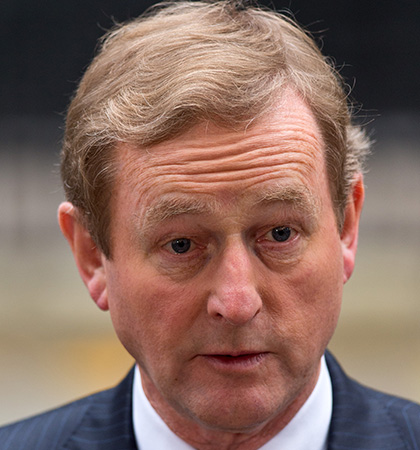IRELAND could return to the polls within a year as uncertainty in the Dáil continues in the fallout from the general election.
Just a week ahead of the Republic’s centenary, the country remains without a government, with the defeated Fine Gael-Labour coalition sitting in a caretaker role until a resolve is reached.
An Oireachtas spokesperson told The Irish Post that the Government will meet again before Easter to continue discussions.
“The Dáil is scheduled to sit again on March 22 and after that again on April 6,” she said. “What happens next is that if and when a party or a group of parties has a majority and can form a Government, the House will vote on that.”
The uncertainty in the political landscape of Ireland since the February 26 general election has also seen a scaled back programme of government visits for St Patrick’s Day celebrations worldwide.
This year, just 10 ministers will travel overseas to represent Ireland – 29 travelled last year.
Enda Kenny’s planned two-day visit to the US has been cut to just a day to Washington where he will meet with President Obama.
Justice minister Frances Fitzgerald flew to Britain to take part in the London St Patrick’s Day festival on Sunday.
Following the general election no political party gained enough votes to hold a majority government.
 Taoiseach Enda Kenny remains in office in a caretaker role. (Picture: Getty Images)
Taoiseach Enda Kenny remains in office in a caretaker role. (Picture: Getty Images)One of the most likely outcomes now is a minority – where Fine Gael would hold power but be unable to pass legislation without the support of the remaining parties.
But political analyst and commentator Johnny Fallon believes this could lead the government to collapse within a year.
“A minority government is most likely with issue by issue support from opposition parties and a general agreement on a budget,” he told The Irish Post. “That is likely to only last a year before we go to the polls again.”
The newly elected TDs met for the first time since the election on March 10 but failed to reach agreement on how to govern the country.
Enda Kenny officially resigned as Taoiseach.
But according to Longford native Mr Fallon, who is also a member of the Political Studies Association of Ireland, the current caretaker situation cannot hold.
“There is no time limit on it and theoretically if it took years to negotiate a new deal then we could have the caretaker government in place for years,” he said.
“In reality it won't drag on. How day to day business is done in a minority government, there would be no long term planning and this would impact markets and business.”
Several options have been proposed to end the political crisis – including a second election and a power-sharing deal between Fine Gael and Fianna Fáil.
“While the two main parties could join together this is unlikely as it would be the same as Labour and Conservatives forming a coalition in the UK,” Mr Fallon added.
Following the general election Fine Gael and Fianna Fáil are almost on an even footing with Dáil seats but both fall well short of the quota of 79.
Fine Gael holds the highest number of seats on 50; while Fianna Fáil politicians were elected to 44 seats. Sinn Féin won 23 seats while Labour won just six.

